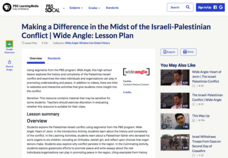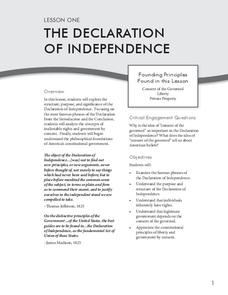Newseum
Putting the Consumer's Questions to Work
Who, what, when, where, why, and how are good questions to ask when evaluating a source. First, scholars find two sources of information relating to a chosen topic. Next, pupils complete a worksheet to gauge the source's credibility....
Newseum
Can I Trust the Creators?
It's easy to find information at the click of a mouse, but is it trustworthy? Pupils learn about the E.S.C.A.P.E. acronym for evaluating sources. Next, learners read a news story and evaluate its sources to determine credibility. Last,...
Franklin Covey
The Habits of Highly Effective Teens
Sally and Joe both want the last cookie in the jar, so they split it in half. That's an example of a win-win situation, one of the many principles Sean Covey outlines in his book The 7 Habits of Highly Effective Teens. Using the...
Equality and Human Rights Commission
Taking Action
The Universal Declaration of Human Rights passed in 1948 when the majority of members of the United Nations voted in favor of the resolution. Scholars use their knowledge of human rights to determine ways they personally can help promote...
Equality and Human Rights Commission
How Do Human Rights Work?
Do human rights apply to children? Scholars learn of three children asking for help to determine their rights and how to handle specific situations. Class members must research any laws pertaining to the requested right and how the...
Equality and Human Rights Commission
Equality
Despite passing the Equality Act in 2010 covering many groups, gender inequality in Great Britain remains. Scholars investigate the concept of equality with a presentation, discussion, and hands-on timeline activities. The seventh lesson...
Judicial Learning Center
Rule of Law WebQuest
Go on a WebQuest to find the Rule of Law! Scholars use the Internet to learn all about how law works in a democracy and how the Rule of Law relates to both American government and governments around the world. Researchers then engage in...
Oxford University Press
Crisis at Fort Sumter
The crisis at Fort Sumter and events related to criminology create an intriguing activity for high schoolers. When clicked on, each box goes into a different part of the event. It also includes the aftermath of the battle in American...
Newseum
Slanted Facts and Slippery Numbers
The Internet is known as the information superhighway, but sometimes it's hard to know when to hit the brakes on unreliable sources. Using a well-rounded lesson plan, pupils read and summarize articles about the gender pay gap and...
Newseum
Evidence: Do the Facts Hold Up?
Sometimes it's hard to escape bad information! Pupils learn the E.S.C.A.P.E. method for evaluating news sources and complete a worksheet to assess a news article using their new skills.
Scholastic
What’s the Good Word? Etymology Project Guidelines
Who named the shapes, or the days of the week? Should words be removed from the dictionary if they're no longer commonly used? Are there too many words in the English language? Language arts students explore these and additional...
California Academy of Science
Exploring the Impacts of Feeding the World
Approximately 50 percent of people in the world who are chronically hungry work in agriculture. While it seems counter-intuitive, the farther you live from a farm, the more food options are available. Scholars explore concepts related to...
California Academy of Science
Nuclear Energy: What's Your Reaction?
OSHA confirms that rules governing worker safety at nuclear power plants ranks higher than worker safety in offices. Scholars must consider safety, cost, alternatives, and other factors before recommending whether a town should build a...
PBS
Making a Difference in the Midst of the Israeli-Palestinian Conflict
What can individuals do to give peace a chance in the Middle East? Through a series of activities including viewing segments from a PBS video, class members learn about the complex history of the conflict and about efforts to promote...
California Academy of Science
Exploring Our Growing Need for Water
Pupils explore the amount of water people use in agriculture and for personal use. They compare water usage for various crops to that of raising animals before considering solutions for increased access to safe drinking water worldwide....
Facebook
Raising Awareness Through Media
Spread the word! Passionate pupils engage in creating multimedia awareness messages during a digital citizenship lesson plan. Using an example of a community social issue message for ideas, individuals then take the reins and begin to...
Facebook
Building Your Activist Network
Can social media bring activists together? Learners gain experience in using online media tools to raise awareness during a hands-on activity from a digital citizenship library. Once they identify a cause, groups create a unified message...
Orlando Shakes
Julius Caesar: Study Guide
What makes a good leader? Use the curriculum guide for William Shakespeare's Julius Caesar to help scholars answer that question. Pupils research the play's historical context and other background information before engaging in...
ReadWriteThink
Designing Museum Exhibits for The Grapes of Wrath: A Multigenre Project
Challenge readers of John Steinbeck's The Grapes of Wrath to create a museum exhibit that uses artifacts to focus on one issue raised by the award winning story of the Great Depression, the Dust Bowl, and the Joads.
The Alamo
The Alamo Then and Now
The Alamo is one of the most famous buildings from the Texas Revolution. But what does it look like today, and how has it changed? Pupils find out more using different interactive modes, including a split-screen and side-by-side version.
Bill of Rights Institute
The Declaration of Independence
Take classes on an in-depth tour of the Declaration of Independence. An informative resource effectively scaffolds learning by providing warm-up and wrap-up activities. It also includes a variety of handouts for individuals to complete,...
University of North Carolina
Literature (Fiction)
An informative installment of the Writing for Specific Fields series helps readers learn how to interpret and write about fiction. The website details nine easy steps for writing a literary analysis—a useful method for all readers!
University of North Carolina
Communication Studies
A degree in communications incorporates disciplines such as business, law, and media as well. A writing handout offers prospective communications majors information about what kind of assignments to expect in a typical course....
University of North Carolina
Art History
Art analysis might help uncover some of life's most puzzling questions, such as the mystery behind Mona Lisa's smile. The handout, from the Writing for Specific Fields series, is particularly useful for those interested in pursuing art...

























